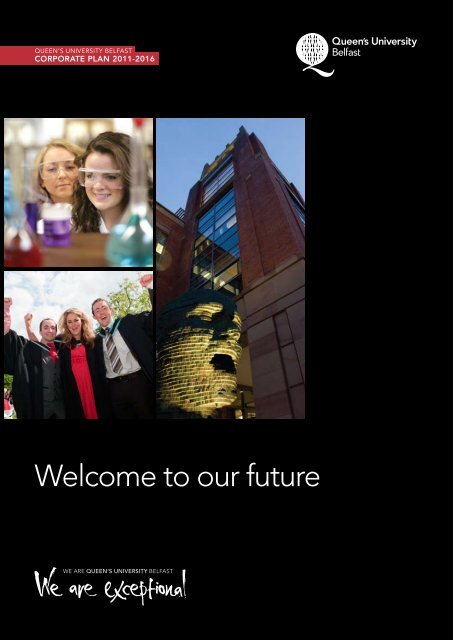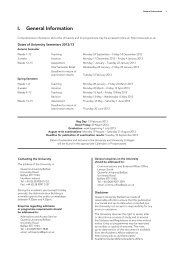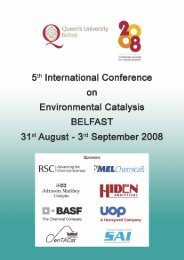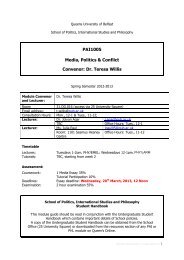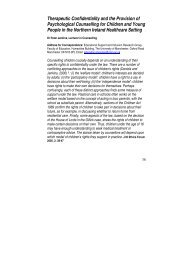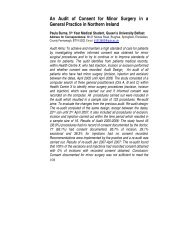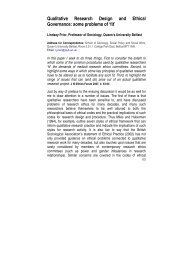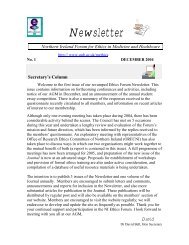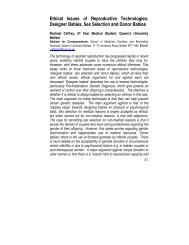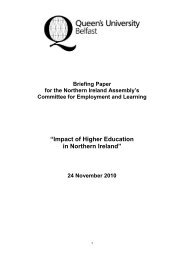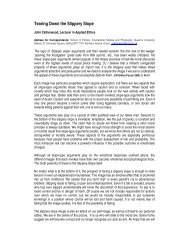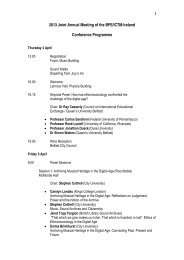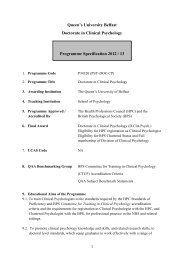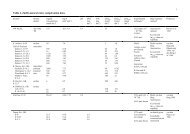Queen's University Corporate Plan 2011-16 - Perrett Laver
Queen's University Corporate Plan 2011-16 - Perrett Laver
Queen's University Corporate Plan 2011-16 - Perrett Laver
Create successful ePaper yourself
Turn your PDF publications into a flip-book with our unique Google optimized e-Paper software.
QUEEN’S UNIVERSITY BELFAST<br />
CORPORATE PLAN <strong>2011</strong>-20<strong>16</strong><br />
Welcome to our future
QUEEN’S UNIVERSITY BELFAST<br />
CORPORATE PLAN <strong>2011</strong>-20<strong>16</strong><br />
Recent achievements:<br />
• Accession to the Russell Group (2006)<br />
• Queen’s Anniversary Prize for Higher and Further Education (2006)<br />
• Institution of Engineering and Technology Faraday Medal (2006)<br />
• UK Female Inventor of the Year (2007)<br />
• UK International Student of the Year (2008)<br />
• Royal Irish Academy Gold Medal (2008)<br />
• Times Higher Education Excellence and Innovation in the Arts (2008)<br />
• Times Higher Education Entrepreneurial <strong>University</strong> of the Year (2009)<br />
• St Andrews Prize for the Environment (2010)<br />
• Times Higher Education Outstanding Engineering Research Team<br />
of the Year (2010)<br />
• Royal Irish Academy Cunningham Medal (<strong>2011</strong>)<br />
• Global Entrepreneurship Educator (<strong>2011</strong>)<br />
• Queen’s Anniversary Prize for Higher and Further Education (<strong>2011</strong>)<br />
• Times Higher Education Most Innovative Teacher of the Year (<strong>2011</strong>)<br />
Nobel Laureate Seamus Heaney<br />
Lifetime Achievement Award 2008<br />
Contents<br />
03. Our Mission<br />
05. Vice-Chancellor’s Foreword<br />
07. Our Strategic Priorities<br />
Still red brickwork<br />
Remains our bulwark:<br />
Here exercise<br />
Of mind has stood<br />
To us, for us<br />
These hundred years,<br />
And will, for good<br />
The Centenary Stanza<br />
by Seamus Heaney<br />
09. - To offer an exceptional student experience<br />
Winner of the Times Higher<br />
Education Most Innovative Teacher<br />
of the Year Award, Senior Teaching<br />
Fellow David Gibson OBE<br />
Times Higher Education<br />
Entrepreneurial <strong>University</strong><br />
of the Year 2009<br />
Queen’s <strong>University</strong> is simply<br />
an excellent example of what<br />
we were looking for from an<br />
entrepreneurial university -<br />
strong leadership and vision,<br />
real student engagement,<br />
innovative faculty and clear<br />
evidence of the impact they have<br />
made in their local environment<br />
National Council for Graduate<br />
Entrepreneurship (NCGE)<br />
11. - To enhance sustainable research areas<br />
13. - To grow an efficient, effective and sustainable enterprise<br />
15. - To develop global citizens and address<br />
international challenges<br />
17. Delivering the Strategic Priorities<br />
19. - Enhancing the Quality of our People<br />
21. - Enhancing the Quality of our Services<br />
23. - Enhancing the Quality of our Infrastructure<br />
25. <strong>Plan</strong> 924i
QUEEN’S UNIVERSITY BELFAST<br />
CORPORATE PLAN <strong>2011</strong>-20<strong>16</strong><br />
03/04<br />
Our Mission<br />
Our Mission... is to become:<br />
a world-class university that<br />
links Northern Ireland to the<br />
global community through<br />
the life-changing experience<br />
we offer to our students, the<br />
distinctive contribution made<br />
to society by our graduates<br />
and the high quality and<br />
impact of our research.
QUEEN’S UNIVERSITY BELFAST<br />
CORPORATE PLAN <strong>2011</strong>-20<strong>16</strong><br />
05/06<br />
Vice-Chancellor’s Foreword<br />
Vice-Chancellor’s<br />
Foreword<br />
Queen’s <strong>University</strong> Belfast has a reputation for excellence in<br />
education and research - a reputation which was acknowledged<br />
by our accession to the Russell Group of the UK’s 20 leading<br />
research-intensive universities in 2006.<br />
This landmark achievement has underpinned a period<br />
of transformational change throughout the period of the<br />
<strong>Corporate</strong> <strong>Plan</strong> 2006-11. Our progress has attracted outstanding<br />
external recognition, both to the <strong>University</strong> as an institution and<br />
to the remarkable people who are shaping its future.<br />
As this document goes to print we learn of further outstanding<br />
external recognition of the <strong>University</strong>’s reputation for<br />
excellence: our fifth Queen’s Anniversary Prize for Higher and<br />
Further Education, awarded on this occasion for Northern<br />
Ireland’s Comprehensive Cancer Services programme.<br />
We have made significant progress towards the objectives set<br />
out in the previous <strong>Corporate</strong> <strong>Plan</strong>. We have enhanced the<br />
quality of our student intake, whilst maintaining access to a<br />
remarkably diverse student population. We have significantly<br />
increased the proportion of postgraduates and we have<br />
substantially increased the proportion of non-Government<br />
income to the <strong>University</strong>.<br />
In looking forward, Queen’s will maintain a clear and consistent<br />
strategic direction focused on excellence in learning and<br />
teaching, excellence in research and leadership in corporate<br />
social responsibility.<br />
In this <strong>Corporate</strong> <strong>Plan</strong> we recognise a key aspiration of the<br />
<strong>University</strong> to move ‘Towards a Global Top 100 <strong>University</strong>’, and<br />
identify four Strategic Priorities upon which we will focus over<br />
the next five years:<br />
• To offer an exceptional student experience and high<br />
quality education, leading to improved progression,<br />
attainment and excellent career opportunities for<br />
our graduates<br />
• To enhance internationally recognised, globally<br />
competitive and sustainable research areas<br />
• To grow an efficient, effective and sustainable enterprise<br />
• To develop global citizens and address international<br />
challenges.<br />
Delivering these priorities will require the continuous<br />
enhancement of our people, services and infrastructure.<br />
Actions and outcomes will be defined through the fully<br />
integrated Academic and Financial <strong>Plan</strong>, with resources being<br />
prioritised accordingly. Our progress against Key Performance<br />
Indicators and agreed targets will be reviewed annually through<br />
our well established Performance Management Reports.<br />
Our progress has attracted<br />
outstanding external recognition<br />
both to the <strong>University</strong> as an<br />
institution and to the remarkable<br />
people who are shaping its future<br />
Higher education is experiencing unprecedented change.<br />
The next five year period will be very challenging as reductions<br />
in Government funding take effect. The <strong>University</strong> will be<br />
innovative and creative in response, and this <strong>Plan</strong> responds with<br />
ambition to the opportunities provided by the new framework<br />
for the funding of higher education and student support in<br />
Northern Ireland.<br />
I commend this <strong>Corporate</strong> <strong>Plan</strong> as the template for the further<br />
development of our <strong>University</strong> over the coming five years, and<br />
I do so in the knowledge that the people of Queen’s are our<br />
greatest resource.<br />
Professor Sir Peter Gregson FREng MRIA
QUEEN’S UNIVERSITY BELFAST<br />
CORPORATE PLAN <strong>2011</strong>-20<strong>16</strong><br />
Our Strategic<br />
Priorities<br />
We are world-class...<br />
As a Russell Group <strong>University</strong> we are one of the UK’s 20<br />
leading research-intensive universities, providing a<br />
world-class education underpinned by world-class research
QUEEN’S UNIVERSITY BELFAST<br />
CORPORATE PLAN <strong>2011</strong>-20<strong>16</strong><br />
09/10<br />
Our Strategic Priorities<br />
STRATEGIC PRIORITY 1<br />
To offer an exceptional student<br />
experience and high quality<br />
education, leading to improved<br />
progression, attainment and<br />
excellent career opportunities<br />
for our graduates<br />
Over the last five years, Queen’s has developed a dynamic<br />
portfolio of education programmes, reflecting the changing<br />
aspirations of students and the future needs of employers from<br />
the professions to small and medium-sized enterprises and<br />
leading multi-nationals. Entrepreneurship is now embedded in<br />
all degree programmes; we excel in widening participation; we<br />
have increased the quality of our undergraduate cohort; and<br />
our postgraduate provision has increased significantly, moving<br />
closer to our goal of a 30% postgraduate student population.<br />
Our International and Postgraduate Student Centre has<br />
provided an excellent facility for our postgraduate students<br />
and the delivery of a distinctive experience for this cohort<br />
remains a priority.<br />
In looking forward we will continue to enhance the student<br />
experience with a particular focus on achieving high levels of<br />
progression and attainment across the <strong>University</strong>.<br />
To achieve this strategic priority, we will focus on selected<br />
strategic actions. We will:<br />
• Provide an academic environment where there is effective<br />
and enriched engagement between staff and students<br />
leading to a high quality education experience, high levels<br />
of student satisfaction and improved progression and<br />
attainment rates for all our students;<br />
• Complement the education experience with a campus life<br />
where students have access to first-class facilities and a<br />
wide range of sporting, social, cultural and communitybased<br />
activities to encourage the development of the<br />
whole person;<br />
• Ensure the curriculum is intellectually challenging, researchinformed,<br />
internationally relevant and delivered by our<br />
leading scholars to meet the current and future needs<br />
of our students and wider society;<br />
• Engage employers and alumni to develop the employability<br />
of our students through employer attuned courses,<br />
embedded skills and local and international opportunities<br />
for work placements.<br />
We will continue to develop<br />
a dynamic portfolio of education<br />
programmes, reflecting the changing<br />
aspirations of students and the future<br />
needs of employers<br />
We will judge our progress by monitoring performance<br />
against agreed targets to meet our ambitions for:<br />
• Progression and attainment levels of 90% for all<br />
undergraduate students, underpinned by advancement<br />
to the first quartile in UK <strong>University</strong> League Tables for our<br />
performance in the student experience;<br />
• Continued enhancement in quality of students gaining<br />
admission to the <strong>University</strong>;<br />
• Enhanced graduate employment.<br />
STUDENT OF THE YEAR 2010<br />
Vincent Murray was named Student<br />
of the Year in 2010. As Chair of<br />
Students In Free Enterprise, a global<br />
network at Queen’s dedicated to<br />
nurturing entrepreneurial skills, he led<br />
a number of peace and reconciliation<br />
projects and assisted a charity in<br />
Uganda which aims to improve the<br />
lives of families torn apart by the<br />
ravages of AIDS.
QUEEN’S UNIVERSITY BELFAST<br />
CORPORATE PLAN <strong>2011</strong>-20<strong>16</strong><br />
11/12<br />
Our Strategic Priorities<br />
STRATEGIC PRIORITY 2<br />
To enhance internationally<br />
recognised, globally competitive<br />
and sustainable research areas<br />
As a broadly-based, research-driven university, Queen’s priority<br />
is to achieve nationally and internationally recognised research<br />
excellence in all of its disciplines, with world-class research in<br />
distinctive niches and thematic areas.<br />
During the previous <strong>Corporate</strong> <strong>Plan</strong>ning period, the <strong>University</strong><br />
recorded a 13% increase in staff volume returned in the<br />
Research Assessment Exercise of 2008, with 53% of the research<br />
activity being rated as internationally competitive.<br />
The <strong>University</strong> has consolidated its position as a Top 20<br />
<strong>University</strong> in terms of research power. Major new partnerships<br />
with business (eg Petronas, Seagate and Bombardier) and with<br />
the public sector (eg Research Councils UK, Wellcome Trust<br />
and NI Health and Social Care Trusts) reflect the <strong>University</strong>’s<br />
growing reputation for high quality research and its translation<br />
to meet the needs of society.<br />
Considerable effort and focus will be required to improve<br />
research performance still further. Internationally competitive<br />
research requires excellent academic leadership, a critical<br />
mass of high quality researchers, sustained research income,<br />
and high impact research outputs which address the global<br />
challenges of our time.<br />
To achieve this strategic priority, we will focus on selected<br />
strategic actions. We will:<br />
• Continue to recruit transformational academic leaders and<br />
high quality early career academics and to grow capacity in<br />
selected areas whilst supporting the career development of<br />
our existing staff;<br />
• Enhance the recognition of high quality research through<br />
strategic placement of high impact outputs to increase<br />
citation rates;<br />
• Enhance international recognition through selective<br />
investment in recognised centres of excellence contributing<br />
to global challenges and leveraging research funding from<br />
RCUK, EU and corporate sources;<br />
• Continue to enhance our research environment and ensure<br />
that inter-disciplinary working is facilitated;<br />
• Ensure that the research activity of staff translates into an<br />
enhanced student experience.<br />
Queen’s priority is to achieve<br />
nationally and internationally<br />
recognised research excellence<br />
in all of its disciplines<br />
We will judge our progress by monitoring performance<br />
against agreed targets to meet our ambitions for:<br />
• High quality and high impact research as determined by<br />
selected external assessments including the Research<br />
Excellence Framework and Global League Tables;<br />
• Increased quality of research outputs in all disciplines<br />
leading to a measurable improvement in quality and impact,<br />
reflecting our ambition to progress towards a doubling of the<br />
institutional citation score;<br />
• Further international recognition of all centres of excellence<br />
at Queen’s;<br />
• Increased levels of research funding, comparable with that<br />
of peer institutions and increased income through corporate<br />
partnerships, consultancy and knowledge transfer;<br />
• Growing evidence of the international impact of our research.<br />
WORLD-CLASS RESEARCH<br />
Queen’s is home to the £7.5 million<br />
ANSIN research hub funded by<br />
Seagate Technology. The hub was<br />
officially opened by the Minister for<br />
Enterprise, Trade and Investment,<br />
Arlene Foster, who is pictured with<br />
Professor Robert Bowman, School<br />
of Mathematics and Physics, and<br />
Vice-Chancellor Professor Sir<br />
Peter Gregson.
QUEEN’S UNIVERSITY BELFAST<br />
CORPORATE PLAN <strong>2011</strong>-20<strong>16</strong><br />
13/14<br />
Our Strategic Priorities<br />
STRATEGIC PRIORITY 3<br />
To grow an efficient, effective<br />
and sustainable enterprise<br />
Over the past five years, the <strong>University</strong> has seen a period of<br />
significant investment shaped by the priorities set out in the<br />
<strong>Corporate</strong> <strong>Plan</strong> 2006-11. We have demonstrated our willingness<br />
to embrace change strategically by identifying areas for<br />
disinvestment in order to free resources for new investment in<br />
areas of strength as, for example, in our recent campaign to<br />
recruit to thirty-five transformational professorial positions.<br />
We are living in changing times. Meeting ambitious goals<br />
within a scenario of reduced public funding presents a<br />
particular challenge. Costs must be removed and non-<br />
Government income increased to enable focused and selective<br />
investment in areas of agreed strategic priority. Sustainability is<br />
a key priority across the <strong>University</strong>. The funding settlement for<br />
higher education in Northern Ireland creates the opportunity<br />
for targeted expansion of the student population.<br />
We must ensure that we continue to invest in our academic<br />
provision, in our people and in our infrastructure in a way that<br />
enhances the long-term sustainability of the <strong>University</strong>.<br />
Meeting ambitious goals within<br />
a scenario of reduced public funding<br />
presents a particular challenge<br />
To achieve this strategic priority, we will focus on selected<br />
strategic actions. We will:<br />
• Selectively expand our student population, attracting<br />
increased numbers of students from Northern Ireland, other<br />
UK regions and international markets;<br />
• Diversify the income base, including research, consultancy,<br />
commercial and philanthropy, to reduce our dependence on<br />
the core Government grant;<br />
• Ensure the most efficient and effective provision of services,<br />
with management actions and resource allocation aligned to<br />
this end;<br />
• Develop a culture of robust, effective and timely decisionmaking,<br />
promoting a greater sense of ownership and<br />
responsibility in decision-making at all levels, underpinned by<br />
transparency and excellent communication;<br />
• Build on our corporate performance management reporting,<br />
drawing on accessible and robust management information<br />
with progress being monitored by smart KPIs consistently<br />
used across ‘one university’;<br />
• Strengthen engagement with the Foundation Board in<br />
supporting and delivering key institutional projects.<br />
We will judge our progress by monitoring performance<br />
against agreed targets to meet our ambitions for:<br />
• An increasingly multi-cultural student population, with<br />
Northern Ireland students broadening their experiences<br />
through international internships and study abroad<br />
programmes;<br />
• An increasingly diversified income base, securing resources<br />
from a wide range of sources and increasing our leverage<br />
against Government income, reinforcing our commitment to<br />
4% growth, year-on-year, in our non-block grant income;<br />
• A sustainable business model to deliver the core mission of<br />
teaching and research underpinned by effective engagement<br />
and the communication of our value propositions to our<br />
customers, internal and external;<br />
• Minimise cross-subsidy in order to maximise investment in<br />
agreed strategic priorities.<br />
EXECUTIVE EDUCATION<br />
Founders’ Club members contributed<br />
more than £1 million to Queen’s Executive<br />
Education Centre at Riddel Hall. Members<br />
are pictured with the Registrar and Chief<br />
Operating Officer, James O’Kane, and<br />
Director of Development and Alumni<br />
Relations Norma Sinte.
QUEEN’S UNIVERSITY BELFAST<br />
CORPORATE PLAN <strong>2011</strong>-20<strong>16</strong><br />
15/<strong>16</strong><br />
Our Strategic Priorities<br />
STRATEGIC PRIORITY 4<br />
To develop global citizens and<br />
address international challenges<br />
While Queen’s has recently enjoyed some high profile<br />
international recognition for its work in ‘green chemistry’<br />
with Petronas and in winning the St Andrews Prize for the<br />
Environment for leading a project that will deliver arsenic-free<br />
drinking water to 80 million people in South East Asia, the<br />
<strong>University</strong> lacks the international presence of its comparator<br />
universities, whether that is measured by international student<br />
recruitment or by international research collaboration.<br />
In <strong>2011</strong>, the <strong>University</strong> agreed a new Internationalisation<br />
Strategy, and full and effective implementation is now the<br />
priority. The past year has seen greater engagement with this<br />
agenda across the <strong>University</strong>, and we are now in a position<br />
to capitalise on these developments. Recent institutional<br />
collaborations have included a joint venture with INTO<br />
<strong>University</strong> Partnerships and strategic partnerships with<br />
Georgetown and Vanderbilt Universities, <strong>University</strong> Malaya<br />
and Petronas, Bengal Engineering and Science <strong>University</strong> and<br />
the National Institute of Immunology in India, and Shanghai<br />
Jiao Tong <strong>University</strong>, Shenzhen <strong>University</strong> and the China<br />
Medical <strong>University</strong>.<br />
We will now build on these developments to ensure that our<br />
students of today become the global citizens of tomorrow, and<br />
in partnership with leading institutions around the world, we<br />
make our full contribution to meet global challenges.<br />
To achieve this strategic priority, we will focus on selected<br />
strategic actions. We will:<br />
• Focus our efforts on increasing international student<br />
recruitment and mobility, the pursuit of high quality, high<br />
impact research with international collaborators, profile<br />
building in-country, and powerful alumni engagement;<br />
• Provide a distinctive and sought-after experience for<br />
international students;<br />
• Develop and implement an integrated marketing and<br />
recruitment plan to meet realistic and agreed international<br />
recruitment targets, supported by a comprehensive<br />
scholarship framework;<br />
• Strengthen our engagement with international stakeholders,<br />
including our international alumni;<br />
• Continue to strengthen our profile in-country through<br />
recognised partnerships and physical presence.<br />
We will ensure that our<br />
students of today become the<br />
global citizens of tomorrow<br />
We will judge our progress by monitoring performance<br />
against agreed targets to meet our ambitions for:<br />
• Growing an international student population to 10% of the<br />
total student population by 20<strong>16</strong>;<br />
• Increased numbers of Queen’s students gaining international<br />
experience;<br />
• New international research collaborations leading to high<br />
quality research outputs;<br />
• Increased international research income from global funding<br />
bodies, companies, trusts and philanthropy.<br />
INTERNATIONAL LABORATORIES<br />
Collaboration with Petronas, the<br />
Malaysian Fortune 500 oil and gas<br />
company, resulted in the creation<br />
at Queen’s of the first universitybased<br />
Petronas laboratory in Europe.<br />
Pictured are Datuk Dr Zainal Abidin<br />
Haji Kasim, Vice-Chancellor of<br />
Universiti Teknologi Petronas and<br />
Professor Ken Seddon, Co-Director<br />
of QUILL, School of Chemistry and<br />
Chemical Engineering.
QUEEN’S UNIVERSITY BELFAST<br />
CORPORATE PLAN <strong>2011</strong>-20<strong>16</strong><br />
Delivering the<br />
Strategic Priorities<br />
No matter where I meet people in the world,<br />
there is a path that leads back to Queen’s<br />
Successful delivery of the strategic priorities will require the complete<br />
engagement of all staff, the provision of high quality professional<br />
services and continued investment in the <strong>University</strong> infrastructure.<br />
Dr Liam Neeson OBE,<br />
Actor and Honorary Graduate
QUEEN’S UNIVERSITY BELFAST<br />
CORPORATE PLAN <strong>2011</strong>-20<strong>16</strong><br />
19/20<br />
Delivering the Strategic Priorities<br />
Enhancing the Quality<br />
of our People<br />
Our staff are Queen’s most valuable resource and, at any time,<br />
our most significant investment. Our ongoing success depends<br />
on the outstanding performance of all our staff and, as with our<br />
students, it is important that staff feel proud to work at Queen’s<br />
and are engaged with its goals and plans.<br />
We will continue to provide a staffing profile which is aligned to<br />
the forward looking priorities of the <strong>University</strong>. Within a positive<br />
working environment we will recruit the best individuals and<br />
develop them to realise their full potential.<br />
We will cultivate an ethos of high quality leadership and<br />
management. In partnership with the Leadership Foundation<br />
for Higher Education, we have introduced pan-<strong>University</strong><br />
Leadership Development Programmes to raise our capabilities<br />
and make our <strong>University</strong> ever more responsive to change.<br />
We will become an ‘employer of choice’, maintaining our<br />
sector-leading commitment to equality and diversity with<br />
particular emphasis on extending best practice as recognised<br />
by Athena Swan Awards and through our position as the top<br />
employer for women in Northern Ireland and one of two UK<br />
universities in the Top 50.<br />
We are committed to developing the alumni network as a<br />
potent force of mutual support for each other and for their<br />
alma mater. We will engage with our alumni to broaden the<br />
recruitment, experience and employment opportunities for our<br />
students and to support philanthropic giving to enhance the<br />
development of our <strong>University</strong> and its people. We must further<br />
develop a network of influential opinion formers to enhance<br />
Queen’s profile regionally, nationally and internationally.<br />
Actions to Support Delivery of Strategic Priorities<br />
• Embed a culture of positive performance across the<br />
<strong>University</strong> through consistent implementation of Performance<br />
Management for all staff, both to reward good performance<br />
and to address underperformance;<br />
• Implement a sustained recruitment campaign to increase<br />
the numbers of academic staff and to support the successful<br />
delivery of our education and research objectives;<br />
• Review and develop a more effective framework to enhance<br />
the level of meaningful staff engagement in Schools<br />
and Directorates, supported by current technology and<br />
social media;<br />
Our staff are Queen’s most<br />
valuable resource and, at any time,<br />
our most significant investment<br />
• Promote equality and diversity in all staffing matters, with<br />
particular emphasis on maintaining our progress towards<br />
achieving a more representative proportion of female staff in<br />
senior positions, especially in the STEM subjects;<br />
• Provision of effective and up-to-date staff development<br />
opportunities for all staff;<br />
• Development of an environmentally aware workforce<br />
and student community, recognising and realising the<br />
opportunities created through individual and <strong>University</strong><br />
contributions to global sustainability.<br />
LEADING EXPERTS<br />
Queen’s Professor Maire O’Neill<br />
was the UK Female Inventor of the<br />
Year in 2007 and is now regarded as<br />
one of Europe’s leading experts in<br />
cryptography. Her work focuses on<br />
security in modern communications<br />
and the development of radio<br />
frequency identification tags.
QUEEN’S UNIVERSITY BELFAST<br />
CORPORATE PLAN <strong>2011</strong>-20<strong>16</strong><br />
21/22<br />
Delivering the Strategic Priorities<br />
Enhancing the Quality<br />
of our Services<br />
High quality professional services are provided by our unitary<br />
academic support sector. The Directorates ensure the efficient<br />
and effective operation of a complex and highly performing<br />
university and contribute to the strategic goals by supporting<br />
all aspects of the core mission of the <strong>University</strong>.<br />
An aspiration to be ‘best in class’, together with a drive towards<br />
greater ‘customer focus’, has been a guiding principle in<br />
recent years. Engagement with both internal and external<br />
customers, from our students and post-primary schools to<br />
employers and research funders, has been a priority. It has<br />
informed, for example, the restructuring within our Directorates<br />
and the development of our Student Guidance Centre, the<br />
International and Postgraduate Student Centre, and the<br />
Executive Education Centre at Riddel Hall.<br />
The <strong>University</strong> is currently investing in its core management<br />
information systems to underpin efficient data collation and<br />
reporting within and outwith the <strong>University</strong>. Full implementation<br />
of these systems will ensure that information is collected,<br />
managed and disseminated in the most efficient manner and<br />
used to inform high quality and timely decision-making. This will<br />
be especially important as the <strong>University</strong> seeks to be ever more<br />
responsive to the changing needs and expectations of society.<br />
We will continue to develop a culture in which staff take<br />
ownership and responsibility for their decisions and ‘add<br />
value’ in everything they do. We will further develop the ‘one<br />
university’ concept, encouraging respect and collaboration<br />
across the <strong>University</strong>. At all times we will seek the most efficient<br />
means of delivering a high quality, and people-centred, service.<br />
The quality of our services will be continually enhanced to meet<br />
the needs of a highly performing university.<br />
An aspiration to be ‘best in<br />
class’, together with a drive towards<br />
greater ‘customer focus’, has been a<br />
guiding principle in recent years<br />
Actions to Support Delivery of Strategic Priorities<br />
• Recognise the <strong>University</strong> as a ‘customer-based organisation’<br />
in which positive and timely engagement is fostered with all<br />
customers, from students to research partners;<br />
• Understand the perceptions of students, staff and external<br />
customers, and introduce a ‘customer satisfaction’ Key<br />
Performance Indicator with action plans to increase the<br />
level of satisfaction of all customers;<br />
• Invest in our core management information systems to<br />
underpin efficient data collation and reporting within and<br />
outwith the <strong>University</strong>;<br />
• Streamline our processes and procedures, removing<br />
unnecessary bureaucracy and facilitating effective and<br />
timely decision-making.<br />
MEDICS IN PRIMARY SCHOOLS<br />
Northern Ireland’s Chief Medical<br />
Officer Dr Michael McBride is given a<br />
‘health check’ by Megan McNulty, a P7<br />
pupil at Lisnasharragh Primary School,<br />
at the <strong>2011</strong> Medics in Primary Schools<br />
launch. Through the initiative<br />
undergraduate medical students<br />
spend time in primary schools, giving<br />
pupils a better understanding of their<br />
own health.
QUEEN’S UNIVERSITY BELFAST<br />
CORPORATE PLAN <strong>2011</strong>-20<strong>16</strong><br />
23/24<br />
Delivering the Strategic Priorities<br />
Enhancing the Quality<br />
of our Infrastructure<br />
Our estate has been transformed over the past decade, and<br />
Queen’s now has one of the most distinctive campuses in the<br />
UK or Ireland. Within a rolling five year strategic plan, £205m<br />
has been invested in maintaining and enhancing the estate,<br />
with significant enhancements to the facilities for learning,<br />
research, service provision and the working and recreational<br />
environment for students and staff.<br />
A <strong>University</strong> commitment to reinvest 5% of the insurable value<br />
of the estate each year, together with effective leverage of<br />
Government funding and rigorous adherence to the delivery<br />
of business plans, has underpinned successful execution of<br />
an ambitious Capital <strong>Plan</strong> to create distinctive and effective<br />
living spaces to enhance the experience of the staff and<br />
students of Queen’s.<br />
Major capital projects have included: the prize-winning McClay<br />
Library; the innovative Institute for Electronics, Communications<br />
and Information Technology as anchor tenant on the Northern<br />
Ireland Science Park; the <strong>University</strong>’s Centre for Cancer<br />
Research and Cell Biology co-located with the Belfast Clinical<br />
Cancer Centre; the new Executive Education Centre co-located<br />
with the Queen’s <strong>University</strong> Management School on the Riddel<br />
Hall Campus; and the creation of a distinctive suite of student<br />
facilities, including Queen’s Elms Village, Students’ Union,<br />
Student Guidance Centre, International and Postgraduate<br />
Student Centre, and the extended Physical Education Centre<br />
and refurbished Malone Playing Fields.<br />
We will continue to maintain and enhance the <strong>University</strong>’s<br />
estate and IT infrastructure to support the strategic priorities<br />
set out in this <strong>Plan</strong>.<br />
After our people, serviced space is our most costly asset and<br />
we must continue to promote a culture of effective and efficient<br />
use of high quality facilities across the <strong>University</strong>.<br />
We will maintain our commitment to strategic investment in our<br />
infrastructure, although the level of investment will be impacted<br />
by the reductions in Government funding. The development<br />
of the new Health Sciences Campus is the largest and most<br />
ambitious development of the estate in the history of the<br />
<strong>University</strong> and will extend beyond the period of this <strong>Plan</strong>.<br />
Enhancing connectivity to high speed, accessible and secure IT<br />
systems is a priority across the <strong>University</strong> and we will maintain<br />
a rolling programme of equipment upgrade for those services<br />
provided in-house and to manage efficient provision of that<br />
which can be outsourced effectively.<br />
Actions to Support Delivery of Strategic Priorities<br />
• Continue to invest strategically in the estate and IT<br />
infrastructure to support the delivery of the four strategic<br />
priorities, although the level of investment will be reduced<br />
as a result of the reductions in Government funding;<br />
• Continue to enhance the sustainability of our estate;<br />
• Seek greater utilisation of space, particularly in regard to<br />
teaching while seeking further opportunities to develop<br />
new income streams through external contracts;<br />
• Progress development of the Health Sciences Campus<br />
to provide a focus for the pursuit of world-class medical<br />
education and translational research.<br />
Our estate has been<br />
transformed over the past decade,<br />
and Queen’s now has one of the<br />
most distinctive campuses in the<br />
UK or Ireland<br />
WORLD-CLASS FACILITIES<br />
The McClay Library, which has<br />
2,000 reader places and houses<br />
1.2 million volumes, won the RICS<br />
(Royal Institution of Chartered<br />
Surveyors) Sustainability Award 2010.<br />
Pictured with the award is Director<br />
of Estates Gary Jebb (left) and<br />
Alistair Dunn, Chairman of the<br />
RICS NI Judging Panel.
QUEEN’S UNIVERSITY BELFAST<br />
CORPORATE PLAN <strong>2011</strong>-20<strong>16</strong><br />
25/26<br />
<strong>Plan</strong> 924i<br />
<strong>Plan</strong> 924i<br />
This <strong>Corporate</strong> <strong>Plan</strong> focuses on four strategic priorities which, if<br />
fully implemented, will progress the <strong>University</strong>’s stated ambition<br />
to move ‘Towards a Global Top 100 <strong>University</strong>’. At the heart<br />
of this <strong>Corporate</strong> <strong>Plan</strong> will be <strong>Plan</strong> 924i where the strategic<br />
priorities are each summarised by a core numeric goal:<br />
9 - reminding us that we will not only increase student<br />
satisfaction levels but, through this, achieve 90% progression<br />
and attainment rates for all undergraduate students by 20<strong>16</strong><br />
These institutional goals will be reflected in specific targets<br />
which will be agreed for the <strong>University</strong> and for individual<br />
Schools and Directorates. Our progress will be judged through<br />
our well established framework for Performance Management.<br />
Every member of the Queen’s family can contribute to <strong>Plan</strong><br />
924i; together we will shape the next stage of development<br />
of our exceptional <strong>University</strong>.<br />
Every member of the Queen’s<br />
family can contribute to <strong>Plan</strong> 924i;<br />
together we will shape the next<br />
stage of development of our<br />
exceptional <strong>University</strong><br />
STUDENT OF THE YEAR <strong>2011</strong><br />
2 - reflecting our ambition to progress towards a doubling of<br />
the institutional citation score<br />
4 - reinforcing our commitment to 4% growth in income,<br />
year-on-year, from sources other than the Government<br />
block grant<br />
Therese White was named Student<br />
of the Year in <strong>2011</strong>. She won an<br />
internship with NASA in Florida, the<br />
only UK student to do so, and assisted<br />
with preparations for the final mission<br />
of the space shuttle, Endeavour.<br />
i - reflecting that internationalisation pervades all that we do<br />
and we will deliver on our plans to increase the diversity of<br />
our students and the global reputation of our research.
For further information,<br />
please contact the <strong>University</strong>’s Communications<br />
and External Affairs Office<br />
Tel: +44 (0) 28 9097 3091<br />
E-mail: comms.office@qub.ac.uk<br />
CDS 73977<br />
www.qub.ac.uk


